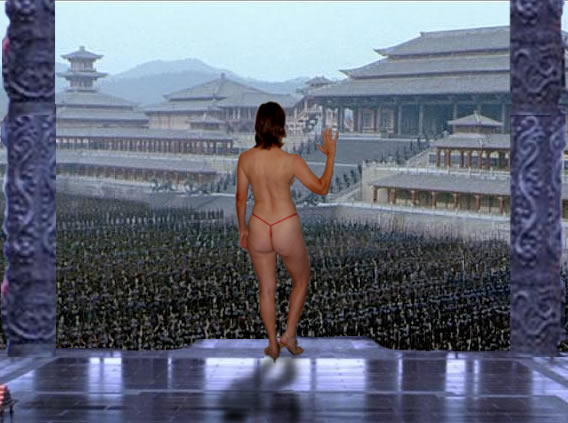Thong dynasty
 |
This article is a flimsy excuse to get pictures of tits on Uncyclopedia. Don't change a thing to remedy this. |
“Thong twisters suck.”
“There once was an Empress of Thong / who enjoyed a good go on a dong. / She liked to be quick / on cocks that were thick / and also on those that were long.”
“Tartuffe: "Avant que de parler, prenez-moi ce mouchoir." Dorine: "Comment?" Tartuffe: "Couvrez ce Thong, que je ne saurais voir."”
“The Beavers did not care to talk to Fish: / They did not dote on Herrings' songs: / They never had experienced the dish / To which that name belongs: / "A Dynasty to found, that is our wish, / as mighty as the Thongs!"”
“A scientist came to Skid Valley, / Exploring without dilly-dally. / The Empress of Thong, / She did him most wrong: / Exhausted he came from that rally”
The Thong Dynasty in the Taint region and bordered by the Flange Mountains lasted from about 80CM to 90CM and existed in a narrow strip, along the Skid Valley, known as the Pe Ri Nee Um Way. Evidence has been found of a triangular encampment at the end of the valley on an overgrown hill known as the Pu Den Da.
Archeology has shown that Pu Den Da is unusual in that it has two gates - one large outer set and one smaller inner set. There is conflicting evidence as to whether the inner set were visible from the outside.
The palace was guarded by a statue of a mythical creature known as "The Hymen" (or Cherrii in local dialect). According to the myth, it guards the entrance to sacred temples and is said to scream loudly and spit blood if anyone tries to enter uninvited.
Close inspections of the area around the encampment show it may have been cleared at some point, but apparently the undergrowth has grown back very quickly. The valley river is renowned for its bearded clams and many who have studied the area have found evidence of camel toes suggesting trade.
There are also extensive folktales about the lost city of Clitt Ohris. Difficult to find and rarely visited, if it even existed and it could not possibly be as wonderful as the standard accounts of the time describe. Like El Dorado, obvious signs that it is a myth have not stopped many adventurers spending their lives searching for it. Sometimes in the most unlikely places.
Archeology[edit]
Professor W. Booty has described as truly ecstatic discoveries made in the main trench - which runs down the length of the main encampment.
"A lot of pirates and the occasional archaeologist come here looking for treasure and always leave happy", she said.
The site holds an eternal beauty and fascination for the whole of mankind, and many quite rightly believe it may be the birth place and inspiration for our whole civilization.
Professor A.B.S. Booty is also quoted as saying: "Many of the treasures on the site are as delicate as they are precious and I recommend a feather is used for the gentlest investigations".
Some of our most exciting and memorable responses have been had exploring the site with battery operated probes.
Prof. Booty explains: "The technique is very similar to conventional ground radar, but using lightweight battery operated plastic instruments. Basically we keep pushing the device in and taking it out until we get a satisfactory response. That can be anything from a few minutes to around half an hour, depending on how disturbed the ground is when we start."
History[edit]
General History[edit]
The area is thought to have been depopulated during the menstrual period and re-populated soon afterwards.
"The area has gone through several periods of low activity that we know as 'dry patches' but is basically very fertile and people are inevitably drawn back", Prof. Booty reports.
The menstrual periods are thought to have come to an end during the late middle ages.
The Roman general Coitus Interruptus was sent to invade by Emperor Phallus, but was forced to withdraw shortly before saturating the area.
Lineage[edit]
The Thong Dynasty may have come out of the Pan Ti Line, and was of female line descendency including:
- Empress Pu Tzi
Who planted the original Lai Dee Gardens, the outline of which we can see today. The empress notoriously had her first husband (Yu Chi Ting Fuk) executed for adultery. Pu Tzi kept dogs known as Growlers. Visitors to the palace we expected to pay their respects by stroking the Empresses growler. Growlers were much admired. Some say worshipped. Like modern day poodles they had hairdressers. The people of Thong liked nothing more than to see the empress walking down the main street showing off a new hairstyle on her growler. Growlers loved bones which were kept in a honey pot with a narrow neck. The royal dog keeper would always get his fingers sticky before giving a Growler a good feed.
- Empress Gu Sett
Believed to have introduced the ritual of the Golden Shower on the Yellow River, that is still enjoyed by many to this day.
- Emperor Mee No Fan Nee
The female line only died out once leading to the only leader who founded the successful Fan Nee line.
- Empress Sho Mee Fan Nee
Opened dialogue with the wider world and established trade - particularly in art.
Sho Mee was first married to Han Shan Dee. Although the union was a happy one, they had no children before Han Shan Dee died. There are conflicting reports that his eyesight deteriorated prematurely and he fell to his death on an unfamilar track in the Flange Mountains, or that he died of terminal friction burns.
Sho Mee then had a brief affair with Suk Mee Kok, but he lost interest when she refused to adopt the swallow ritual of the northern city.
Sho Mee eventually married Go Bang Wang and did have children.
There are records that the couple fell out during the pregnancy, which led to a dispute called the Dang Ding Dong, which lasted to some time after the birth of Dru Pi.
To this day the palace is said to be haunted, because it is claimed that Han Shan Dee returned to the palace to mediate settlement between his ex-wife and new husband during that difficult time.
Sho Mee was a great fan of jewellery and often seen sporting a fine pearl necklace - particular during her marriage to Suk Mee.
She was also a great collector of porcelain vases and was always keen to show visitors her Minge.
- Empress Buk Khet Fan Nee
Had the most (around 15) children by her husband Fuk Dai Long.
- Empress Dru Pi Fan Nee
Thought to be very popular, the last and the longest reigning of the Empresses. She was eventually brought down by the evil hoards of the warlord Cel Yu Lyt. They were renowned for their distinctive shiny purple helmets.
All the empresses were buried in sacred Y shaped coffins as befitting their standing in society.
People[edit]
Ping Pong Dang is known to have been a visitor to the Thong Dynasty which has links to Bangkok. He was renowned for leaving at great speed and surprising accuracy. He's not to be confounded with Ping Pong Dang, "Last Descendant of the Thong Dynasty", who claims to be... well, the last descendant of said Dynasty. Rumour has it that he was expelled from the territory for heresy and a devious attraction to pasta.
John Thomas, a westerner, is also known to be a very frequent visitor though his stays are thought to be short. Often too short.
Wii Wii Fan Nee is worthy of mention as a minor member of the Fan Nee line who never became empress but left her mark by introducing watersports to the Yellow River. She eventually married a Japanese warlord called Nin Ten Do.
Another regular visitor was a trader called Tam Pon. His trades are unclear but it is documented that his caravan was so wide that it could entirely stem the flow on the Pe Ri Nee Um Way by itself.
The most famous sailor ever to have touched this territory would be the Flemish Pirate Jean Bart, according to the stories he told at the very end of his life. The glow in his otherwise dim eyes seemed to confirm Professor Booty's sayings about "Pirates always leaving happy".
Another visitor was Juan King from South America. He came all by himself.
Culture[edit]
Although it is not known as home to many contemporary poets, the landscape has managed to inspire many a cunning linguist. In an effort to have a poet to call its own, the dynasty is rumoured to have offered permanent residence to Henry W. Longfellow.
Many limericks and tongue twisters are also known to have arisen the Skid Valley area.
The Thong Dynasty is known to have revered the beaver in much the same way as the Eygptians worshipped the cat. A similar break-away culture to the north is thought to have emulated the elaborate Thong rituals of the beaver, using a swallow. There is thought to have been some cross-over between the two civilisations and they are thought to have lived in harmony.
The holy communion of the Thongs involved drinking from the furry cup. This practice was eventually integrated in to the Christian faith and is the real explanation why the Catholic ceremony of the same name refers to eating someone. However in the sort of perverse inversion of morality so common in the Catholic faith, the Catholic ceremony only takes place with red fluid where as the pure and honest ceremony of the Thongs must never take place that way (ewww).
Economy[edit]
The economy was essentially agricultural and the dynasty is believed to have dedicated as much time as possible to country matters. After early and frankly disastrous experiments with slash and burn they developed a method known as trim and wax. Although developed independently it is thought to be very similar to the method of clearance we know today as Brazilian.
Along with farming the Thongs were extremely proficient fishermen and the city is said to have often reeked of fish on market day (and other days but the reason for this is less clear). Whale tales were also popular and often seen around the marketplace.
Along with very adept anglers, who took great care with the meat on their hook and were once known as the world's Master Baiters, there were also the clam divers known as the Muff, who are reputed to have learnt to breath through their ears on the express instructions of Lik Mee Pu Tse, half-sister of Sho Mee.
Despite their great love of fishing the dynasty abhorred crabs and giving them to the Empress was a capital offence.
However Sho Mee took a great interest in fish and invented her own deep fried coating which she named after her family as Fan Nee batter.
The Emperor liked nothing better than when Sho Mee gave him a full fish supper. Sho Mee was also famous for her baking and particularly her fantastic buns which her chef enjoyed covering in cream from his large piping tool.
| ||||||||||||||||



